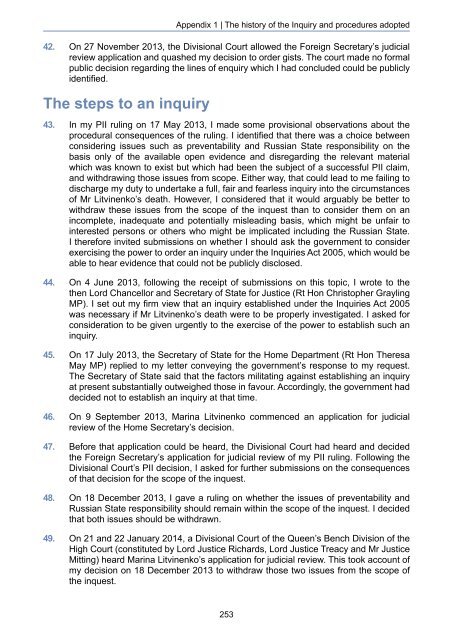The Litvinenko Inquiry
JIEp7Zyr
JIEp7Zyr
Create successful ePaper yourself
Turn your PDF publications into a flip-book with our unique Google optimized e-Paper software.
42. On 27 November 2013, the Divisional Court allowed the Foreign Secretary’s judicial<br />
review application and quashed my decision to order gists. <strong>The</strong> court made no formal<br />
public decision regarding the lines of enquiry which I had concluded could be publicly<br />
identified.<br />
<strong>The</strong> steps to an inquiry<br />
Appendix 1 | <strong>The</strong> history of the <strong>Inquiry</strong> and procedures adopted<br />
43. In my PII ruling on 17 May 2013, I made some provisional observations about the<br />
procedural consequences of the ruling. I identified that there was a choice between<br />
considering issues such as preventability and Russian State responsibility on the<br />
basis only of the available open evidence and disregarding the relevant material<br />
which was known to exist but which had been the subject of a successful PII claim,<br />
and withdrawing those issues from scope. Either way, that could lead to me failing to<br />
discharge my duty to undertake a full, fair and fearless inquiry into the circumstances<br />
of Mr <strong>Litvinenko</strong>’s death. However, I considered that it would arguably be better to<br />
withdraw these issues from the scope of the inquest than to consider them on an<br />
incomplete, inadequate and potentially misleading basis, which might be unfair to<br />
interested persons or others who might be implicated including the Russian State.<br />
I therefore invited submissions on whether I should ask the government to consider<br />
exercising the power to order an inquiry under the Inquiries Act 2005, which would be<br />
able to hear evidence that could not be publicly disclosed.<br />
44. On 4 June 2013, following the receipt of submissions on this topic, I wrote to the<br />
then Lord Chancellor and Secretary of State for Justice (Rt Hon Christopher Grayling<br />
MP). I set out my firm view that an inquiry established under the Inquiries Act 2005<br />
was necessary if Mr <strong>Litvinenko</strong>’s death were to be properly investigated. I asked for<br />
consideration to be given urgently to the exercise of the power to establish such an<br />
inquiry.<br />
45. On 17 July 2013, the Secretary of State for the Home Department (Rt Hon <strong>The</strong>resa<br />
May MP) replied to my letter conveying the government’s response to my request.<br />
<strong>The</strong> Secretary of State said that the factors militating against establishing an inquiry<br />
at present substantially outweighed those in favour. Accordingly, the government had<br />
decided not to establish an inquiry at that time.<br />
46. On 9 September 2013, Marina <strong>Litvinenko</strong> commenced an application for judicial<br />
review of the Home Secretary’s decision.<br />
47. Before that application could be heard, the Divisional Court had heard and decided<br />
the Foreign Secretary’s application for judicial review of my PII ruling. Following the<br />
Divisional Court’s PII decision, I asked for further submissions on the consequences<br />
of that decision for the scope of the inquest.<br />
48. On 18 December 2013, I gave a ruling on whether the issues of preventability and<br />
Russian State responsibility should remain within the scope of the inquest. I decided<br />
that both issues should be withdrawn.<br />
49. On 21 and 22 January 2014, a Divisional Court of the Queen’s Bench Division of the<br />
High Court (constituted by Lord Justice Richards, Lord Justice Treacy and Mr Justice<br />
Mitting) heard Marina <strong>Litvinenko</strong>’s application for judicial review. This took account of<br />
my decision on 18 December 2013 to withdraw those two issues from the scope of<br />
the inquest.<br />
253


